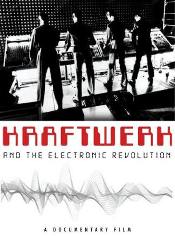
Kraftwerk and the Electronic Revolution
Executive Producer: Rob Johnstone; Editor: Tom O’Dell
Chrome Dreams/MVD

You’d think that at three hours, a documentary about the Dusseldorf band Kraftwerk and the development of electronic music in Germany would be pretty much everything you need to know. Despite its merits, of which there are many, this film ultimately falls short both in content and execution.
As far as content goes, the film has one fatal flaw. It does not include the participation of primary Kraftwerk members Florian Schneider and Ralf Hutter. We do hear from percussionist Karl Bartos, who was a member of Kraftwerk between 1975 and 1991 and who provides valuable insights on working with Schneider and Hutter. Klaus Roder, who was a member for a short time in 1974, also appears briefly. But the architects of the band’s hugely influential sound remain still something of a mystery when it’s all said and done.
Among the others we hear from in the film are electronic music pioneers like Conrad Schnitzler, Hans Joachim Roedelius, Dieter Moebius, Klaus Schulze, Wolfgang Seidel, and engineer Klaus Lohmer. Music journalists including David Stubbs, Edwin Pouncey, Ingeborg Schober, and Manfred Gillig-Degrave are interviewed as well. Also getting the call are punk/new wave drummer-turned-DJ Rusty Egan and Dave Ball, half of the “Tainted Love” pop duo Soft Cell (one of the many synth bands owing a debt to Kraftwerk).
But it is Irish journalist and author Mark Prendergast who makes the biggest impression and often has the most cogent insights into the band’s discography. As Wynton Marsalis is to Ken Burns’ Jazz series, Prendergast is to this film. Unfortunately even he gets arguably too much screen time over the course of this three-hour epic.
The structural problem of the film is that it often feels like three different ones, and not just because of the length. There are zippy, well-narrated portions of the documentary that take us from post-war Germany, through the work of the early electronic music pioneers and like-minded outfits like Tangerine Dream and Can, through each of Kraftwerk’s studio releases from 1971’s Kraftwerk 1 to 1986’s Electric Café, and through the band’s influence on everything from the David Bowie/Brian Eno collaborations of the late ’70s to disco, hip hop, and synth pop. That could be a fascinating 90-minute documentary all by itself.
Interspersed throughout, however, are the aforementioned interviews, shot on digital video, that often don’t seem well-integrated into the other parts of the film. The electronic music pioneers and journalists are allowed to go on at length, often in thick German accents, providing valuable but sometimes hard to follow detail about the players and historical events in this electronic revolution.
As we get into the Kraftwerk discography, a third film emerges. We get the chance to hear fairly lengthy portions of key album cuts set to interesting visuals. This stuff is great. Unfortunately it draws attention to the fact that there is little music during other parts of the film. Had the filmmakers chosen to use more music, it could have livened up some of those occasionally dry interviews and kept this train moving along a bit more. You get the feeling they had to be very selective about the music they licensed for the film, which is a shame, but an understandable reality these days.
All that being said, there are many moments and insights in the film that I enjoyed a great deal. The section on 1974’s Autobahn, with its homage to the Beach Boys redefined for the German identity, is fascinating. So, too, is the section about Bowie and Eno’s efforts to bring experimental electronic music to a wider audience. Prendergast’s explanation of why Trans-Europe Express is Kraftwerk’s masterpiece and one of the great albums of all time is also worth the price of admission. And hearing Bartos talk about what groups coming from England in the early ’80s brought to electronic music is intriguing, too.
Too often though, the film is just too disjointed, unwieldy, and incomplete to be the definitive document devoted to this subject. The Kraftwerk fan and the ethnomusicologist in me want to love this DVD. But I can’t escape the nagging feeling that it could have been so much more… and less.
MVD/Chrome Dreams: http://www.chromedreams.co.uk












